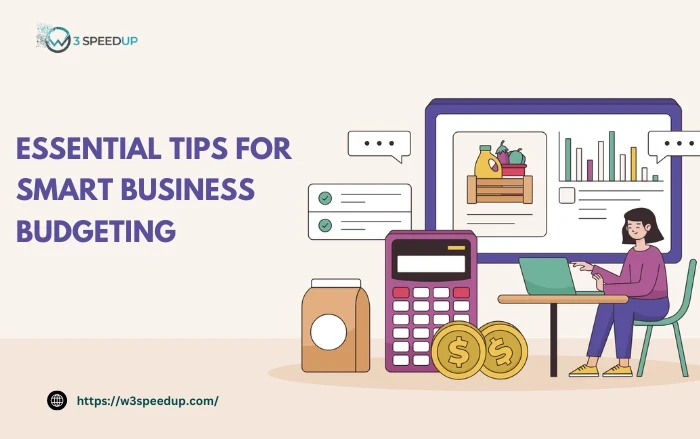Budgeting is essential for any business, regardless of size or industry. It involves planning and managing financial resources to achieve company goals. However, budgeting can be daunting, especially for small businesses with limited resources. This guide will discuss key factors every business owner should consider when budgeting. These will help create a strong and effective budget to guide your business toward success.
Budgeting for Your Business: Key Points to Keep in Mind
 Assessing Your Current Financial Situation
Assessing Your Current Financial Situation
Assessing your current financial situation is the first step in creating a budget for your business. This involves taking an inventory of your company’s assets, liabilities, and cash flow. Have a clear understanding of your current financial standing before you start making any budgeting decisions. This assessment will help you identify areas where you can cut costs or invest more resources. It will also give you a realistic view of your company’s financial health and enable you to set achievable goals for the future. Assessing your current financial situation can help you identify any potential risks or challenges that may affect your budget plan.
 Identifying and Prioritizing Business Goals
Identifying and Prioritizing Business Goals
Your budget should align with your overall business objectives and help you achieve them in a timely and efficient manner. This is why it’s crucial to identify and prioritize your company’s goals before creating a budget. Consider what you want to achieve in the short-term and long-term, such as increasing sales, expanding into new markets, or improving customer satisfaction. Prioritize these goals based on their importance to your business and allocate resources accordingly. For example, if you are a small coffee shop owner looking to franchise your business, your top priority may be obtaining Dutch Bros Coffee franchise information or finding suitable locations for expansion. This will help guide your budget decisions and ensure that you are investing in areas that will contribute to the growth of your business.
 Researching Market Trends and Industry Standards
Researching Market Trends and Industry Standards
Researching market trends and industry standards is crucial for effective business budgeting. It involves staying updated on the latest developments and analyzing consumer behavior and market demand. This helps you make accurate revenue projections and anticipate potential fluctuations. Comparing your financial performance with industry standards can guide necessary budget adjustments. Understanding market trends can also reveal growth opportunities or threats to your business’s financial stability.
 Estimating Income and Expenses
Estimating Income and Expenses
Estimating your income and expenses involves projecting the amount of revenue your business will generate, as well as estimating the expenses you will incur to run your operations. To estimate income, consider past sales data, industry trends, and potential growth opportunities. For estimating expenses, take into account fixed costs such as rent, salaries, and insurance, as well as variable costs such as supplies and utilities. Be realistic when estimating both income and expenses to avoid any discrepancies in your budget plan. Regularly reviewing and updating your estimates can also help you make necessary adjustments to your budget throughout the year.
 Accounting for Potential Risks and Contingencies
Accounting for Potential Risks and Contingencies
Budgeting for your business should account for potential risks and contingencies like unexpected expenses, economic downturns, or market changes. Have a contingency plan and allocate resources for these risks. This can help mitigate negative impacts and maintain financial stability. Regularly reassess and update your plan to stay prepared for unexpected events. Being proactive about potential risks is crucial for long-term success.
 Regularly Reviewing and Adjusting Your Budget
Regularly Reviewing and Adjusting Your Budget
A budget is not a set-it-and-forget-it process; it needs constant monitoring and adjustments to stay effective. Regular reviews can help spot discrepancies or overspending. It also allows you to adjust for market shifts or changes in business goals. Evaluating your spending’s effectiveness may mean reallocating funds if a certain strategy isn’t delivering the expected ROI.
 Seeking Professional Help with Budgeting
Seeking Professional Help with Budgeting
Seeking professional help with budgeting can be beneficial for businesses of all sizes. Experienced financial advisors or accountants can offer valuable insights and expertise to help create a more accurate and effective budget plan. They can also guide managing cash flow, forecasting future expenses, and identifying potential risks. Moreover, they can assist in creating realistic goals and strategies to achieve them within your budget constraints. With their knowledge and experience, they can help you make informed decisions and avoid common budgeting mistakes. Consider seeking professional help with budgeting to ensure the financial success of your business.
Budgeting is an ongoing process that requires constant monitoring and adjustments to ensure your business’s long-term success. It’s not just about setting initial limits but also about tracking expenditures and revenues regularly to stay on track. Make use of professional help if needed, such as financial advisors or accountants, to gain expert insights. Stay proactive in identifying potential risks and opportunities for growth, which can help in making informed decisions and fostering sustainable development. By doing so, you can maintain financial health and achieve your business goals more effectively.
 Christmas Mega Sale – Enjoy Up to 50% OFF on Every Plan!
Christmas Mega Sale – Enjoy Up to 50% OFF on Every Plan! 


